San Francisco County Superior Court
The Superior Court of California of the County of San Francisco is the state superior court with jurisdiction over the City and County of San Francisco.
| San Francisco County Superior Court | |
|---|---|
| 37.781°N 122.419°W | |
| Established | 1850 |
| Jurisdiction | San Francisco |
| Location | San Francisco |
| Coordinates | 37.781°N 122.419°W |
| Appeals to | California Court of Appeal for the First District |
| Website | sfsuperiorcourt |
| Presiding Judge | |
| Currently | Hon. Garrett L. Wong |
| Since | Jan 1, 2019[1] |
| Lead position ends | Dec 31, 2020 |
| Assistant Presiding Judge | |
| Currently | Hon. Samuel K. Feng |
| Since | Jan 1, 2019[2] |
| Court Executive Officer | |
| Currently | T. Michael Yuen |
| Since | Sep 3, 2010[3] |
History
Courthouse functions were incorporated into San Francisco City Hall prior to 1997. The village of Yerba Buena, seized by Commodore John D. Sloat in July 1846, was renamed to San Francisco in January 1847.[4]: 104, 110 Initially, the Custom House on Brenham Place and Washington Street was used for municipal offices.[4]: 147
With the influx of immigrants seeking gold during the California Gold Rush in 1849, the population swelled and a nativist gang calling themselves The Hounds began harassing Spanish-American immigrants.[4]: 148 The first court system was organized after a public meeting on July 16, 1849, demanding the Hounds be brought to justice; the leaders were put on trial and sentenced to ten years imprisonment and the leaderless organization dissolved shortly thereafter.[4]: 149 Subsequently, planning began for the first California Constitutional Convention and a local election was held on August 1, 1849, naming ten delegates; these men were advised by John W. Geary, the recently-elected First Alcalde (equivalent to the mayor), that "in the absence of any state legislative authority, they were supreme in the district" as the ayuntamiento (town council, equivalent to the modern San Francisco Board of Supervisors).[4]: 143
After the first state constitution was adopted, a city charter was passed in the state legislature and a subsequent election in May 1850 saw Geary elected as the first mayor.[4]: 155 The city offices had outgrown the Custom House and the Graham House, built initially as a four-storey hotel on the northwest corner of Kearny and Pacific, was purchased for US$150,000 (equivalent to $5,276,000 in 2022) to serve as the new City Hall.[4]: 156 Members of a group that previously had held a vigilante justice trial in February 1851 continued the legacy of the Hounds, later forming the San Francisco Committee of Vigilance in June 1851.[4]: 172–173 The Graham House was destroyed during the fifth "great fire" of June 22, 1851, and the former Jenny Lind Theater was purchased in 1852 for US$200,000 (equivalent to $7,035,000 in 2022) to serve as a replacement City Hall and Courthouse.[4]: 170, 184
Gold mine production peaked during the winter of 1852–53 and many miners left the city;[4]: 216–217 by 1855, the population boom and bust had produced what historian John Hittell called "a greater depth of [political] corruption in San Francisco than in any other part of the United States. The people were new-comers, not long acquainted with their leading men, and their officials were selected at random."[4]: 241 Notable failures of justice, including the fraud of Henry Meiggs and the murder of James King of William, led to the revival of the Committee of Vigilance in May 1856,[4]: 243–246 which subsequently was dissolved that August.[4]: 259
In 1870, Yerba Buena Square, previously used as the city cemetery in the 1850s,[5]: 516 was graded to prepare for the construction of the first purpose-built City Hall.[4]: 382 Plans from Augustus Laver were selected and construction began in 1871 but the building was not completed until a quarter-century later, in 1895.[5]: 712–713 As historian John P. Young wrote in 1912, "The cost as originally estimated was quite modest, but there were plenty of critics who declared that it would be largely exceeded. The most pessimistic, however, did not even remotely approach the truth in making their guesses."[6]: 406 It was destroyed during the April 1906 San Francisco earthquake and subsequent fire.
In 1976 the Court helped to create the San Francisco Pretrial Diversion Project,[7] a nonprofit organization that helps to provide alternative punishments for misdemeanors and parking violations, in an attempt to divert petty offenders from overcrowded courtrooms.[8]
Judges
Katherine Feinstein (daughter of Senator Dianne Feinstein) had been the presiding judge of the court from 2011 through 2012.[9][10] Judge Cynthia Ming-Mei Lee was elected the new presiding judge on June 27, 2012. The court is composed of 52 judges and twelve commissioners.[11] The court currently has two commissioners.[12]
In December 2016, John Stewart, chief judge at the court, discarded 66,000 arrest warrants for criminal infractions, like sleeping on the sidewalk, public urination, and public drunkenness, stating "You're putting somebody in jail because they're poor and can't pay a fine. We got a lot of criticism, but we thought it was the right thing to do."[13]
Venue
The courthouse for the San Francisco County Superior Court is located at 400 McAllister St, San Francisco, CA 94102. It was opened on December 9, 1997.[14] The building was designed by Lee/Timchula Architects. The local architect was Cavagnero and Associates.
The entrance features fabricated metal doors designed by sculptor Albert Paley.
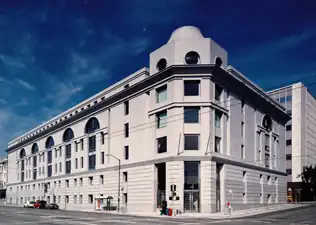 San Francisco County Superior Courthouse is located on MacAllister St. in San Francisco, near the Civic Center. It was designed to match the context of nearby government buildings.
San Francisco County Superior Courthouse is located on MacAllister St. in San Francisco, near the Civic Center. It was designed to match the context of nearby government buildings.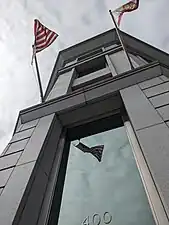 Detail of the exterior tower
Detail of the exterior tower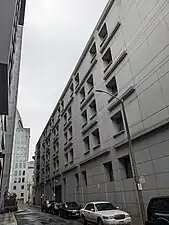 Exterior facing Redwood Street is an expression of modernism and functionality.
Exterior facing Redwood Street is an expression of modernism and functionality.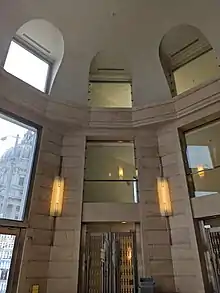 Interior Rotunda: Interior detail of the rotunda is abstracted neoclassical architecture and is also considered post-modern.
Interior Rotunda: Interior detail of the rotunda is abstracted neoclassical architecture and is also considered post-modern.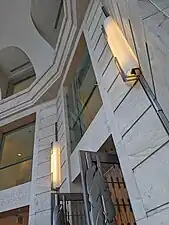 The entry rotunda features metal doors fabricated by Albert Paley of Paley Studios.
The entry rotunda features metal doors fabricated by Albert Paley of Paley Studios.
References
- "San Francisco Superior Court Bench Elects SF Native, Veteran Jurist to Serve as Presiding Judge" (PDF) (Press release). Superior Court of the State of California, County of San Francisco. October 5, 2018. Retrieved October 29, 2020.
- "San Francisco Superior Court Bench Elects New Assistant Presiding Judge" (PDF) (Press release). Superior Court of the State of California, County of San Francisco. November 1, 2018. Retrieved October 29, 2020.
- "Yuen named executive officer of Superior Court". San Francisco Examiner. August 26, 2010. Retrieved October 29, 2020.
- Hittell, John Shertzer (1878). A history of the city of San Francisco; and incidentally of the state of California. San Francisco: A. L. Bancroft & Company.
- Young, John P. (1912). San Francisco: A history of the Pacific coast metropolis. Vol. 2. San Francisco: The S. J. Clarke Publishing Company.
- Young, John P. (1912). San Francisco: A history of the Pacific coast metropolis. Vol. 1. San Francisco: The S. J. Clarke Publishing Company.
- "San Francisco Pretrial Diversion Project website". Retrieved September 7, 2012.
- Landsittel, Sue (December 10, 2003). "Parking Break". SF Weekly. Retrieved September 7, 2012.
- "Presiding Judge". Superior Court of California, County of San Francisco. Retrieved July 19, 2011.
- "Katherine Feinstein retiring as judge". San Francisco Chronicle. December 19, 2012.
- Yuen, Michael (January 13, 2011). "Superior Court News Release" (PDF) (Press release). Retrieved May 30, 2015.
- "San Francisco Superior Court Alphabetical Listing" (PDF). April 20, 2015. Archived from the original (PDF) on September 5, 2015. Retrieved May 30, 2015.
- Egelko, Bob (December 7, 2016). "SF judge explains why 66,000 arrest warrants were discarded". SFGate.
- Carlsen, William (November 18, 1997). "Female Presiding Judges Honored as Patel Takes Over in S.F." SFGATE. Retrieved December 2, 2021.
